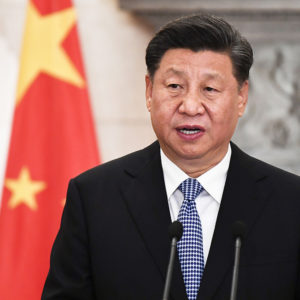After more than a year of pandemic-driven recession, millions of Americans now agree on one simple point—they no longer want to buy products made in China. In fact, almost 80 percent of U.S. consumers say they’d be willing to pay more to support companies moving out of China. Unfortunately, the Senate’s recently passed U.S. Innovation and Competition Act could actually help to boost imports from China and incentivize Beijing’s cheating. That’s because the final bill reduces tariffs on a wide array of China’s subsidized exports. As a result, this signature “China bill”—which was originally intended to counter China’s rise—could end up hurting efforts to rebuild U.S. manufacturing.
Consider the electric vehicle (EV) market. President Joe Biden is banking heavily on a “Build Back Better” agenda that includes plans to convert the federal vehicle fleet to American-made electric vehicles. Along with incentives to promote EVs on U.S. roads, Biden hopes to create 1 million new U.S. auto jobs. Doing so would certainly provide a boost for U.S. automakers—as well as thousands of smaller manufacturing shops throughout the nation’s auto supply chain.
That’s easier said than done. The Senate legislation includes a trade amendment by Sen. Mike Crapo (R-Idaho) that cuts tariffs on 1,423 new products and also extends hundreds of other tariffs. Many of these products could be manufactured at home—but are currently made in China. And high on the list is the automotive and auto parts sector—with the Senate bill even reducing the tariff for electric trucks.
What’s particularly frustrating is that the EV tariff cut stems from a 2019 petition by Mitsubishi-Fuso Bus & Truck Corporation to waive the 25 percent tariff on medium-duty electric trucks. Since then, Mitsubishi has actually abandoned plans to enter America’s EV market. But the petition simply continued along—and became part of the new Senate bill.
EVs are clearly a growth industry. Commercial EV sales are expected to top 3 million by 2025—and triple to nearly 9 million by 2030. Beijing is already looking to dominate this expansion—and is currently building EV factories almost as fast as the rest of the world combined. In fact, China is expected to churn out more than 8 million EVs annually by 2028.
What makes this possible are the billions of dollars in subsidies that Beijing continually funnels to its state-owned EV manufacturers. In 2016 alone, China invested $7.5 billion in its EV manufacturing.
In contrast, Lordstown Motors—one of the start-up manufacturers expected to lead America’s EV future—is currently struggling, and may go out of business in the next year. Lordstown has been planning to start production of its American-made EV pick-up truck this fall. But that future is now unclear and will be under greater threat if subsidized EVs from China enjoy cheaper access to the U.S. market.
The Senate bill also contains a number of other tariff cuts on everything from footwear and paper coatings to work gloves and electric steam irons. More egregious, though, are the many cuts for auto parts, including crankshafts, back door assemblies, stability control actuators, and even “used alternators.”
None of this is helpful for America’s domestic factories as they fight against China’s ongoing import flood. Congress should be tightening the screws on Beijing, not allowing back-door incentives for Chinese factories.
There are some encouraging provisions in the Senate bill including “Buy American” requirements for government spending and a $50 billion subsidy for U.S. semiconductor production. There are also measures to sanction Chinese entities that steal U.S. trade secrets or engage in cyberattacks.
However, the U.S. is on track to post a record annual goods trade deficit of more than $1 trillion this year. If the overriding goal is to make U.S. manufacturers more competitive against China’s heavily subsidized, state-owned factories, then tariff relief for Chinese imports makes no sense. The goal should be to incentivize domestic production, not make it easier for importers to welcome subsidized production from China. As the House takes up this signature “China bill,” it’s time to walk back tariff cuts that could cripple America’s industrial future.

